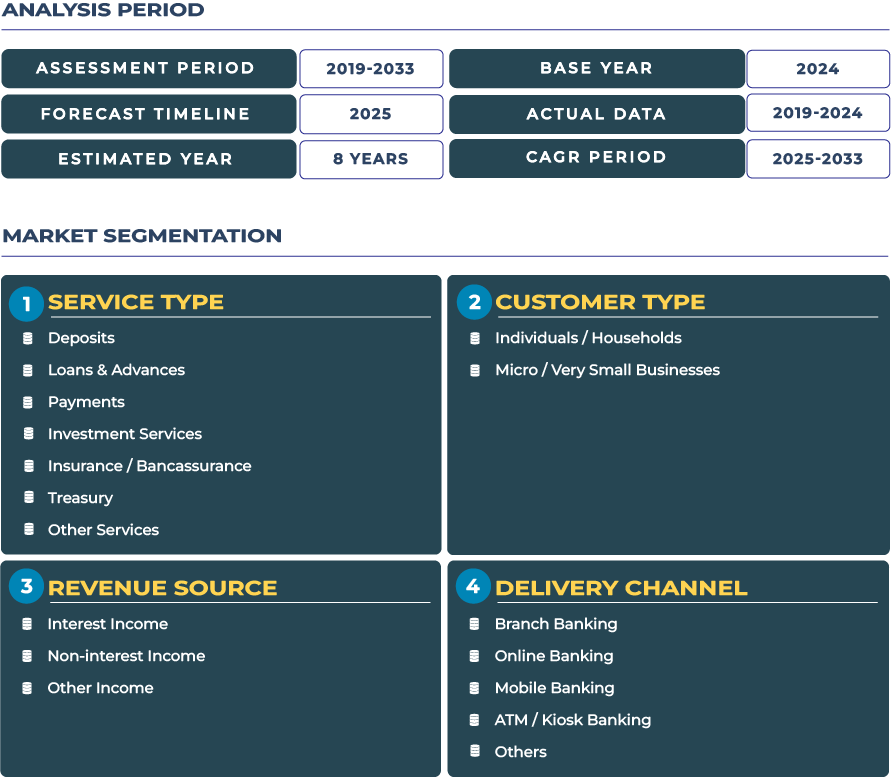Bahrain Retail Banking Reinvention via Blockchain and Fintech Synergy
Bahrain has long positioned itself as a financial hub in the Gulf, and in recent years it is intensifying that position by embedding blockchain, fintech, and digital banking infrastructure into its retail banking ecosystem. With regulatory frameworks encouraging innovation, the Kingdom is crafting a retail banking landscape where wallets, tokenized assets, and seamless digital rails intersect with conventional banking services.
Note:* The market size refers to the total revenue generated by banks through interest income, non-interest income, and other ancillary sources.
Market Outlook: How Bahrain Is Charting a Fintech-Enabled Retail Banking Path
Bahrain retail banking market is estimated to expand from USD 2.5 billion in 2025 to USD 3.2 billion by 2033, representing a CAGR of 3.0%. This growth will derive not just from transaction volume but from value-adding digital services, fintech integration, and bridging between traditional banking and emerging blockchain finance modalities. Bahrain already hosts a robust fintech ecosystem anchored by the Central Bank of Bahrain fintech & innovation frameworks and the onshore regulatory sandbox, which lower barriers for experimentation. The Kingdom’s open banking and payments infrastructure will allow banks to embed blockchain-based asset services, digital identity, tokenized loyalty, and AI advisory within banking apps. As such, retail banking institutions will evolve from deposit-lending engines to holistic financial orchestration platforms, bridging the gap between traditional banking, digital assets, and consumer finance experiences.
Bahrain positioning as a financial gateway and its well-established banking sector provide a structural advantage for cross-border payment flows and fintech partnerships. Retail banks that can integrate cross-border remittance, digital wallet rails, and tokenized asset custody into their retail proposition will gain disproportionate benefit. However, success will require careful alignment of technology, compliance, capital, and customer trust. Banks that convert blockchain utility into sensibly monetized banking relationships will lead Bahrain retail banking evolution.
Drivers & Restraints Sculpting Bahrain Retail Banking Landscape
Strong Fintech Ecosystem & Digital Adoption Empower Retail Banking Growth
Bahrain fintech credentials are well established. The Central Bank of Bahrain has created a Fintech & Innovation Unit and maintains a regulatory sandbox enabling innovators to test financial solutions under supervision. The kingdom also nurtures Bahrain FinTech Bay, a vibrant innovation hub that incubates and accelerates fintech ventures across payments, blockchain, and banking. With over 120 fintech companies now operating locally, fintech adoption is accelerating. The open banking and payments regulatory environment are further enabling interoperability. On the consumer side, internet penetration and smartphone adoption are high, facilitating the uptake of mobile wallets, app-based banking, tokenized loyalty, and embedded finance. These foundations create fertile ground for retail banks to layer digital innovation atop traditional services.
Cybersecurity Risk, Small Market Size & Funding Constraints Impose Limits
That said, Bahrain retail banking growth faces important constraints. As digital banking deepens, cybersecurity, identity fraud, and data protection risk amplify-and banks must invest heavily in secure architecture, risk monitoring, and incident response frameworks. The fixed cost of such infrastructure can weigh on margins, especially in a modest-size market like Bahrain. The domestic population is small, limiting scale-even as Bahrain serves as a financial hub, most retail banking must cater to local or GCC clientele. In response, international linkages, remittance capture, and cross-border digital rails become essential to scale. There is also regional and global competition: large Gulf banks and digital challengers challenge Bahrain retail players. Finally, economic shocks-oil price volatility or regional tensions-can pressure credit demand, deposit behavior, and consumer confidence. Navigating these constraints requires resisting overextension and ensuring financial resilience.
Trends & Opportunities Rewriting Bahrain Retail Banking Horizon
Trend Spotlight: Blockchain Banking, Digital Wallets & Tokenization Take Hold
Bahrain banking and fintech sectors are progressively integrating blockchain-enabled services into retail banking. Features such as tokenized loyalty, asset-backed stablecoins, and digital identity verification are increasingly layered on mobile banking applications. Several banks are piloting blockchain-based trade finance and remittance solutions that integrate with retail banking clients. At the same time, digital wallets are gaining ground-users expect cross-channel payments, merchant wallets, peer-to-peer transfers, and cross-border settlement integrated within banking apps. As wallets take center stage, retail banks can transform payments into banking gateways.
Opportunity Focus: Blockchain-Backed Payment & Trade Finance & AI Advisory Platforms
One compelling opportunity lies in embedding blockchain-powered payment and trade finance modules into retail banking. Banks can support SMEs and individual importers/exporters with digital letters of credit, tokenized invoices, and real-time settlement linked to consumer banking. This value-added module helps retain business clients and drive cross-sell. Another opportunity is AI-driven advisory platforms: integrating robo-advisory, algorithmic wealth allocation, micro-investment, behavior-based nudges, and seamless alternative asset access within banking apps. When backed by smart data aggregation and compliance modules, these tools allow banks to convert dormant savings into monetized relationships and deeper wallet share in Bahrain retail banking sector.
Competitive Landscape: Strategic Moves in Bahrain Retail Banking Arena
Bahrain banking sector is structured around both local and regional players. National Bank of Bahrain(NBB) is the largest locally focused bank, accounting for about 19.5% of domestic retail assets. With HSBC Bahrain recent decision to sell its Bahrain retail operations to BBK, the retail customers, loans, and deposits of approximately 76,000 accounts are being transferred to a locally rooted institution. This move reflects the reorientation of global banks away from low-margin retail in regional markets. Many banks now compete through digital differentiation-leveraging fintech partnerships, embedding blockchain modules, launching AI advisory tools, deploying modular APIs, and rationalizing branch networks. Some institutions use the regulatory sandbox and open banking regime to pilot new offerings, while others invest in cross-border remittance rails or tokenized product lines. The competitive frontier in Bahrain retail banking revolves not around scale but around platform agility, fintech integration, and monetizable innovation within a modest domestic market.







